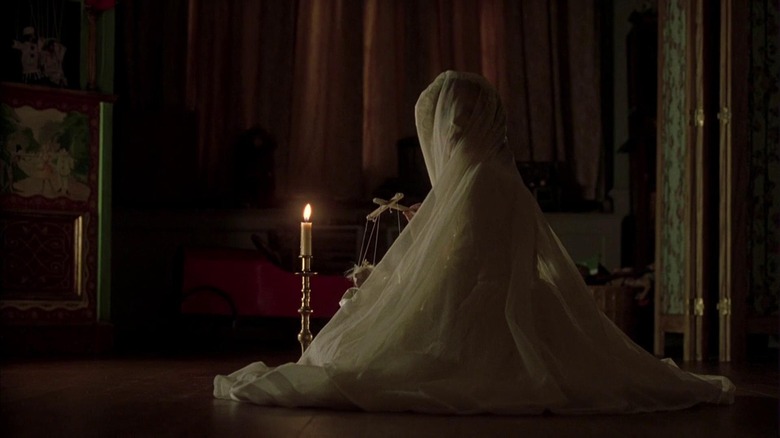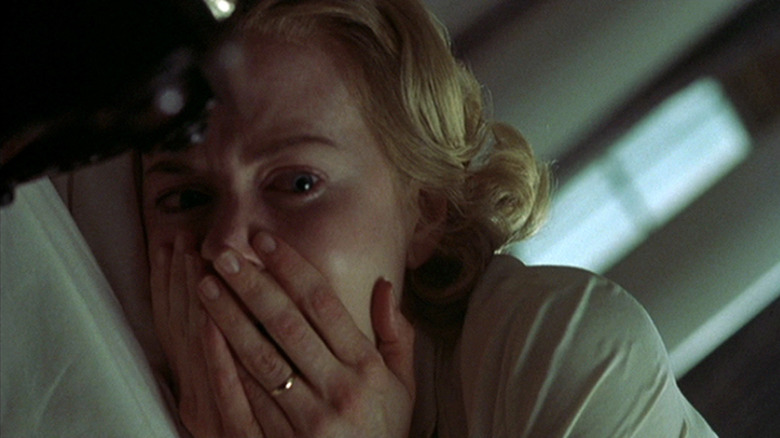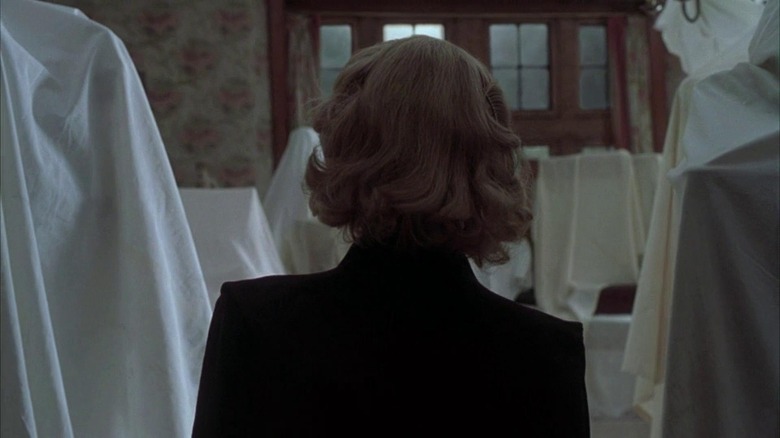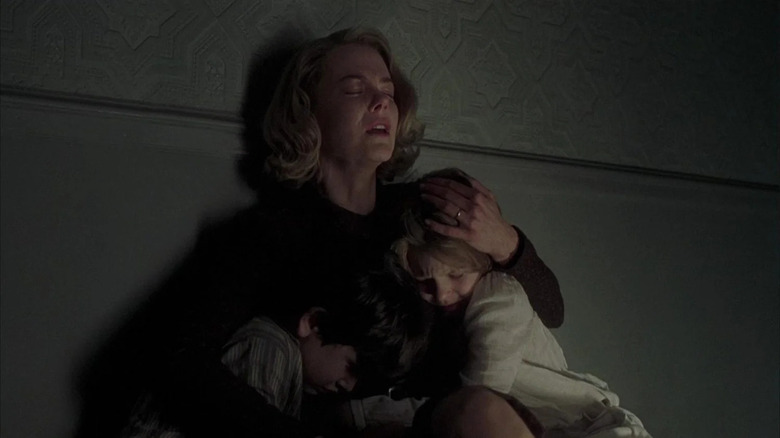The Others Is A Haunting Story, And This May Be One Of Its Scariest Scenes
(Welcome to Scariest Scene Ever, a column dedicated to the most pulse-pounding moments in horror with your tour guides, horror experts Matt Donato and Ariel Fisher. In this edition, Ariel explores the terrifying twist in "The Others" and Matt champions its predecessor.)
It's no great mystery that I adore "The Changeling." So much so, in fact, that I'll write about it as often as possible. As a result, it shouldn't come as a shock that I'd eventually pick "The Others" to write about for this column. Alejandro Amenábar's haunting English-language debut was actively inspired by Peter Medak's ghost story starring George C. Scott, and it shows. There are direct references including the gardener, Mr. Tuttle (Eric Sykes), who is named after the gardener, Mr. Tuttle (played by Chris Gampel in "The Changeling"), as well as tonal similarities. That and an eerie scene with a piano. But it's the film's conclusion that strikes me as the most haunting one of all. It also happens to take almost directly from one of the most iconic scenes in "The Changeling": the seance.
I'm reluctant to give a spoiler warning for a movie that's over 20 years old, but here we are. If you haven't seen "The Others" yet and you happen to be unaware of the Big Twist™, I encourage you to stop reading and start watching. The tone of the movie shifts once you know, and while it remains chilling, it does lose some of its ... bite.
The setup
Our story begins in the immediate aftermath of the second world war in Jersey on the English Channel. In an isolated manor surrounded by atmospheric fog that never seems to lift resides the Stewart family: Grace (Nicole Kidman) and her two children, Nicholas (James Bentley) and Anne (Alakina Mann). Charles (Christopher Eccleston), the family's patriarch, has yet to return from war, and Grace is in need of some help running the massive house. To add to the difficulty, both Anne and Nicholas have a rare and severe disease, most likely xeroderma pigmentosum, which can turn the sunlight lethal.
She hires a group of three travelers looking for work, and they couldn't have come at a better time — she was reaching the end of her rope managing everything on her own.
The story so far
After being welcomed into the house, Mrs. Bertha Mills (Fionnula Flanagan), Mr. Tuttle, and Lydia (Elaine Cassidy, who some of you may recognize from "Harper's Island"), immediately set to work. Mrs. Mills has taken over as the new nanny and housekeeper while Lydia cleans and Mr. Tuttle ... well, he tends to the garden. But things quickly start to go awry. Anne, Grace's eldest, keeps telling tall tales about hearing voices and seeing figures walk through the house. On top of it all, she continues to suggest that their mother went mad not long ago, something Nicholas contests, but Anne adamantly insists is true.
Every day is almost identical to the one before: wake up, eat breakfast, study for first communion, repeat. Grace teaches her kids about limbo, salvation, and Christ, which in hindsight is perversely funny. But Anne seems convinced there are other people in the house. A boy named Victor and his parents who are viewing the house.
Their house.
Grace gets understandably sick and tired of Anne's stories, but soon learns they're not so far-fetched. She starts to hear the voices herself, echoing around her in the hallways. Doors creak open and slam shut in front of her, the piano seems to be playing itself (a nice homage to "The Changeling," including that the piano was there when they moved in), and the curtains even manage to open on their own, potentially putting the children's lives at risk. Anne has seen them a few times, but it's the Old Woman that scares her the most.
Mrs. Mills is convinced that the world of the dead and the world of the living sometimes intersect and that that's what's happening here. Grace can't even fathom such an aberration, saying "the Lord wouldn't allow it." "There isn't always an answer for everything," Mrs. Mills stoically tells her.
Grace leaves the house to go and bring the priest in from town, only to find herself lost in the unending fog. The further she walks, the thicker it gets, until her husband stumbles towards her, inexplicably returning from war. Everything becomes vaguely ethereal from here, with vague exchanges, strong implications, and iconic scenes, but the audience is still missing part of the puzzle.
When the curtains disappear, Grace blames Mrs. Mills and the others, accusing them of trying to kill her children. She throws them out, leaving the kids in the only safe room where she can protect them from the light. Come nightfall, however, they sneak out to wander the grounds.
While scouring the house for the missing curtains, Grace finds a page from an old Victorian book of the dead, only the subjects are frighteningly familiar: it's Mrs. Mills, Mr. Tuttle, and Lydia in the photograph.
The scene
Suddenly, the ghostly trio approaches the kids out of the mist, following them to the house where Grace safely ushers them inside where they can hide together. While they climb into a wardrobe, Mrs. Mills and Mr. Tuttle try to warn Grace that they're now locked in the house with the intruders they've all been searching for this whole time.
Hiding in a dark wardrobe, Nicholas begins to breathe heavily. Another voice can be heard, breathing faintly. "Come with us, children," the voice whispers. Anne's eyes go wide with terror as she and her younger brother gasp. Suddenly, the Old Woman appears as the doors fly open, and the children scream.
Grace hears their shriek from downstairs and goes still, quietly calling out to her children. "The intruders have found them," Mrs. Mills says. "There's nothing we can do now," echoes Mr. Tuttle. "You'll have to go upstairs and talk to them," Mrs. Mills encourages.
Terrified, Grace slowly climbs the stairs, clutching her rosary and reciting the Lord's Prayer. A woman's voice urges the children to speak to her and tell her what happened, while Nicholas' sobs can be heard through the door. Grace opens it to see her son crying in the corner, her daughter hovering over him, protectively, and five perfect strangers seated around a table in the center of the room. They're holding a seance.
"Why are you crying, children," the Old Woman asks, scribbling errantly on a large sheet of paper. "What happened in this room? What did your mother do to you?"
Anne leans in and whispers silently into the woman's ear. Grace's face falls as they lock eyes, her daughter uttering the unspoken thing that's hung over the entire film like a weighted blanket of doom.
"Something about a pillow," says the Old Woman's interpreter, pulling the sheet away to read.
She breaks the stunned silence: "Is that how she killed you? With a pillow?"
Grace drops her rosary. Anne's eyes go wide as she yells, "She didn't kill us!"
"Children," the woman asks, "if you're dead, why do you remain in this house?"
A chorus of screams ensues, with mother and children all crying "We're not dead!" at the top of their lungs, desperate to be heard. But the sad truth is that they are, and have been this whole time.
The impact (Matt's take)
"The Others" nails its gotcha clincher when the initial shock of understanding that these characters we've grown attached to are actually dead nestles deep. It's unexpected (the first time), but not immensely scary. In fact, Nicholas' reaction to the deceased groundskeepers makes me smile as he stubbornly asks why he should be afraid of the approaching spirits. "They're ghosts!" "WHAT?!" I'm sorry, it's funny! (Ariel: it is, he's right.)
While not especially terrifying, I do find Alejandro Amenábar's seance immensely clever as it discards expectations like you'd toss a 2000s "Hellraiser" sequel in the bin after one watch. They've been ghosts the whole time, afraid of living homeowners? It's a renovation that works so well, and yes, does assert dread as we learn Grace has smothered her children. Where it excels is in storytelling formulas that dare to trick audiences into believing they're watching another recognizable haunted house film until everything upends. Maybe the Old Woman finding both children while hiding is worth its quick-cut spook? Effective, nevertheless.
I mean, it's refreshing to see everything from a ghost's perspective. Why they inhabit houses, why they won't leave, the works. "The Others" presents what so many other haunted house films neglect — reason. There's no denying the significance of Amenábar's finale, and so many lesser films would fumble such an epiphany in its wake, but compared to "The Changeling"? The latter is still king.



